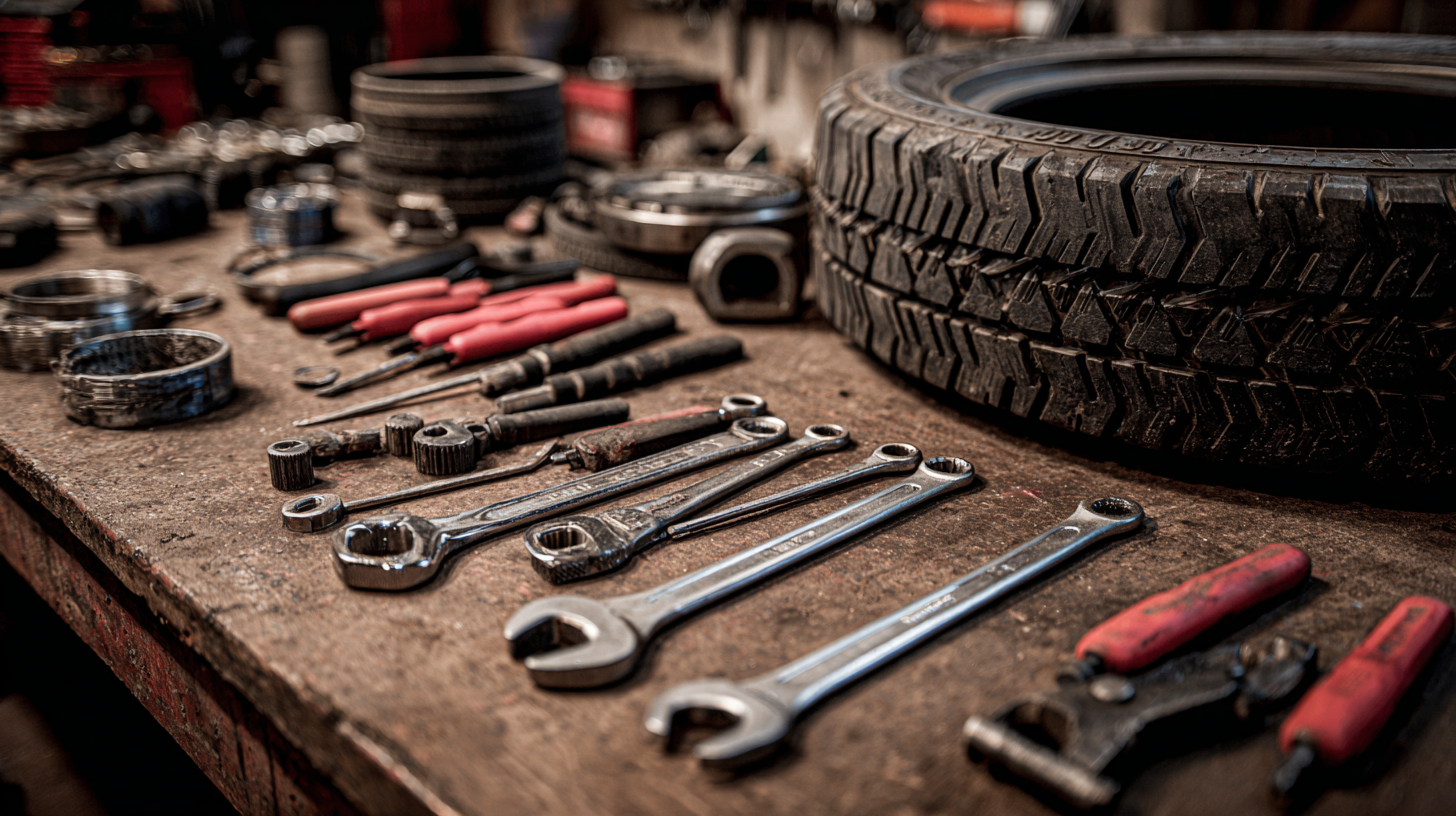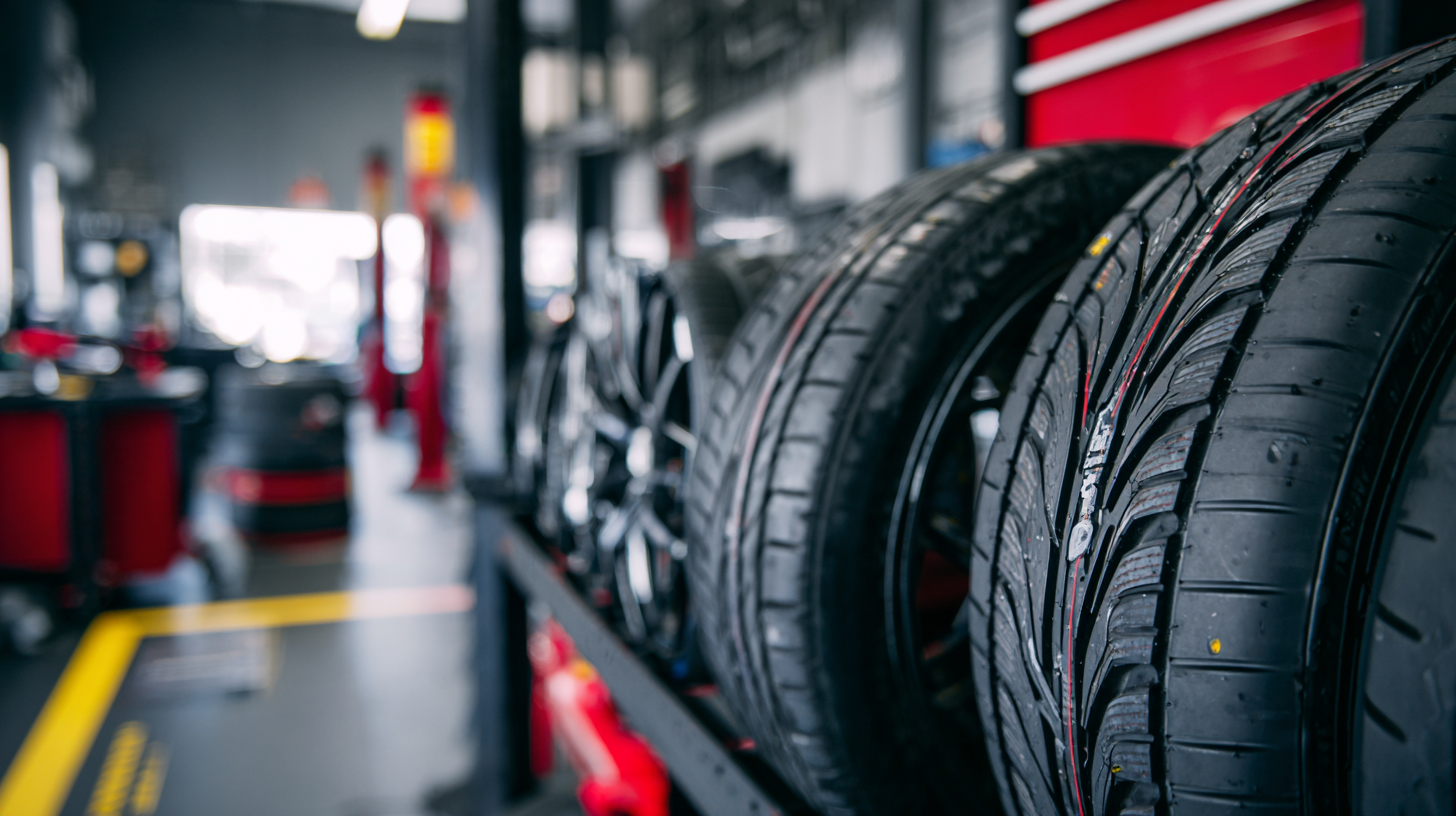Choosing the best tire tools for your business needs is crucial in today’s competitive automotive industry, where efficiency and quality can significantly impact profit margins. According to the Tire Industry Association, the North American tire market is expected to reach approximately $36 billion by 2025, highlighting the growing demand for high-performance tire services. Utilizing the right tire tools not only enhances operational efficiency but also ensures safety and quality in tire maintenance. A recent report from the Automotive Service Association indicates that 30% of service-related issues stem from inadequate tooling and equipment, underscoring the importance of investing in superior tire tools. In this ultimate guide, we will explore the benefits of various types of tire tools, helping you make informed decisions to optimize your business operations and meet customer expectations effectively.

When selecting tire tools for your business, several critical factors come into play to ensure optimal performance. First, assess the specific types of tire services you offer. Different tools are designed for various tasks, such as tire changing, balancing, or repair. Understanding your business's needs will help you choose tools that enhance efficiency and effectiveness. For instance, if your shop specializes in high-performance vehicles, investing in advanced balancing machines may be crucial.
Another essential factor to consider is the quality and durability of the tools. Opting for reputable brands known for their reliability can save you money in the long run, as higher-quality tools often last longer and require fewer replacements or repairs. Additionally, consider the ergonomics of the tools. Tools designed with user comfort in mind not only improve worker satisfaction but also reduce the risk of injuries, leading to a safer work environment. Investing in the right tire tools ultimately contributes to smoother operations and better service delivery for your customers.
When it comes to running a successful tire business, investing in the right tools is crucial. The top five essential tire tools every business should consider include tire changers, tire balancers, wheel alignment machines, tire pressure monitoring system (TPMS) tools, and a bead seat tool. Each of these tools plays a pivotal role in streamlining operations, ensuring safety, and enhancing customer satisfaction.
A tire changer is fundamental for quickly and efficiently replacing tires, minimizing the manual labor involved. Coupled with a tire balancer, it helps in delivering a smoother ride for customers by ensuring proper weight distribution. Additionally, a wheel alignment machine is vital for preventing premature tire wear and ensuring vehicles handle correctly. To address modern vehicles equipped with TPMS, having the right diagnostic tools will save time and improve service quality. Lastly, a bead seat tool is essential for properly seating the tire bead during installation, ensuring a safe and effective fit. Investing in these tools not only enhances service efficiency but also builds customer trust and loyalty.
| Tool Name | Description | Benefits | Price Range |
|---|---|---|---|
| Tire Changer | A machine that assists in removing and installing tires from rims. | Increases efficiency and reduces labor costs. | $1,500 - $10,000 |
| Tire Balancer | A device that measures tire balance to ensure even weight distribution. | Promotes tire longevity and ensures a smooth ride. | $500 - $5,000 |
| Air Compressor | A device used to inflate tires with air. | Fast inflation and can also power air tools. | $100 - $2,000 |
| Tire Pressure Monitoring System (TPMS) Tool | A tool that checks and resets tire pressure monitoring systems. | Ensures proper tire pressure for safety and efficiency. | $200 - $1,000 |
| Tread Depth Gauge | A simple device to measure the depth of tire tread. | Helps in assessing tire wear and safety. | $10 - $50 |
When it comes to running an efficient tire business, utilizing advanced tire tools can significantly elevate your operations. One of the primary benefits is enhanced efficiency. High-quality tire tools streamline processes, allowing technicians to complete tire installations, repairs, and rotations more quickly than ever. This not only saves time but also translates to increased customer satisfaction, as clients appreciate prompt and reliable service.

Another advantage of advanced tire tools is the improved safety they ensure. Tools designed with the latest technology often come with features that minimize the risk of accidents and injuries in the workplace. By using ergonomic designs and safety mechanisms, these tools help protect both the technicians and the vehicles they work on, fostering a safer working environment. This commitment to safety can also boost your business's reputation, as customers are likely to trust businesses that prioritize the well-being of both their employees and their vehicles.
Lastly, investing in advanced tire tools can lead to long-term cost savings. While the initial investment may be higher, the durability and efficiency of modern tools reduce the need for frequent replacements and repairs. Moreover, by minimizing downtime and maximizing productivity, these tools contribute to better overall financial performance for your business. Ultimately, the choice to utilize advanced tire tools not only enhances operational capabilities but also paves the way for sustained business growth.
When selecting tire tools for your business, several common mistakes can hinder your efficiency and productivity. One major pitfall is neglecting to consider the specific needs of your operations. Different businesses, from tire shops to automotive workshops, require distinct tools. Assessing your unique requirements will guide you in choosing the right tools tailored for your applications.
Another mistake is overlooking the quality and durability of tools. Investing in inferior products may save money initially, but can lead to frequent replacements and ultimately higher costs. Prioritize tools from reputable manufacturers known for their reliability. This ensures that your tools can withstand the rigors of daily use without compromising performance.
Additionally, not taking user feedback and expert reviews into account can lead you astray. Engaging with other professionals in your industry can provide valuable insights into the best tools available. Use forums, social media, or trade shows to gather information and recommendations. When combined with thorough research, this can help you avoid costly errors in your purchasing decisions and enhance your operational efficiency.
This chart illustrates the common mistakes businesses make when selecting tire tools, highlighting the importance of understanding specific needs and avoiding pitfalls.
When selecting tire tools for your business, it’s crucial to focus on features that ensure efficiency and effectiveness in your operations. First and foremost, durability is a must-have. Commercial tire tools are often subjected to heavy use, so investing in high-quality, rugged materials will save you money in the long run by reducing the frequency of replacements. Look for tools that come with warranties, as they often signify enhanced quality and reliability.
Another essential feature is ergonomics. Tools that are designed with user comfort in mind can significantly reduce operator fatigue, enhancing productivity during long working hours. Additionally, ease of use is vital; opt for tools that streamline tasks such as tire changing or balancing, allowing for quicker turnaround times. Lastly, compatibility with various tire sizes and types is crucial. Versatile tools that can adapt to different tire specifications will make your service offerings more flexible and cater to a broader client base, ultimately boosting your business potential.

TradeManager
Skype
VKontakte

